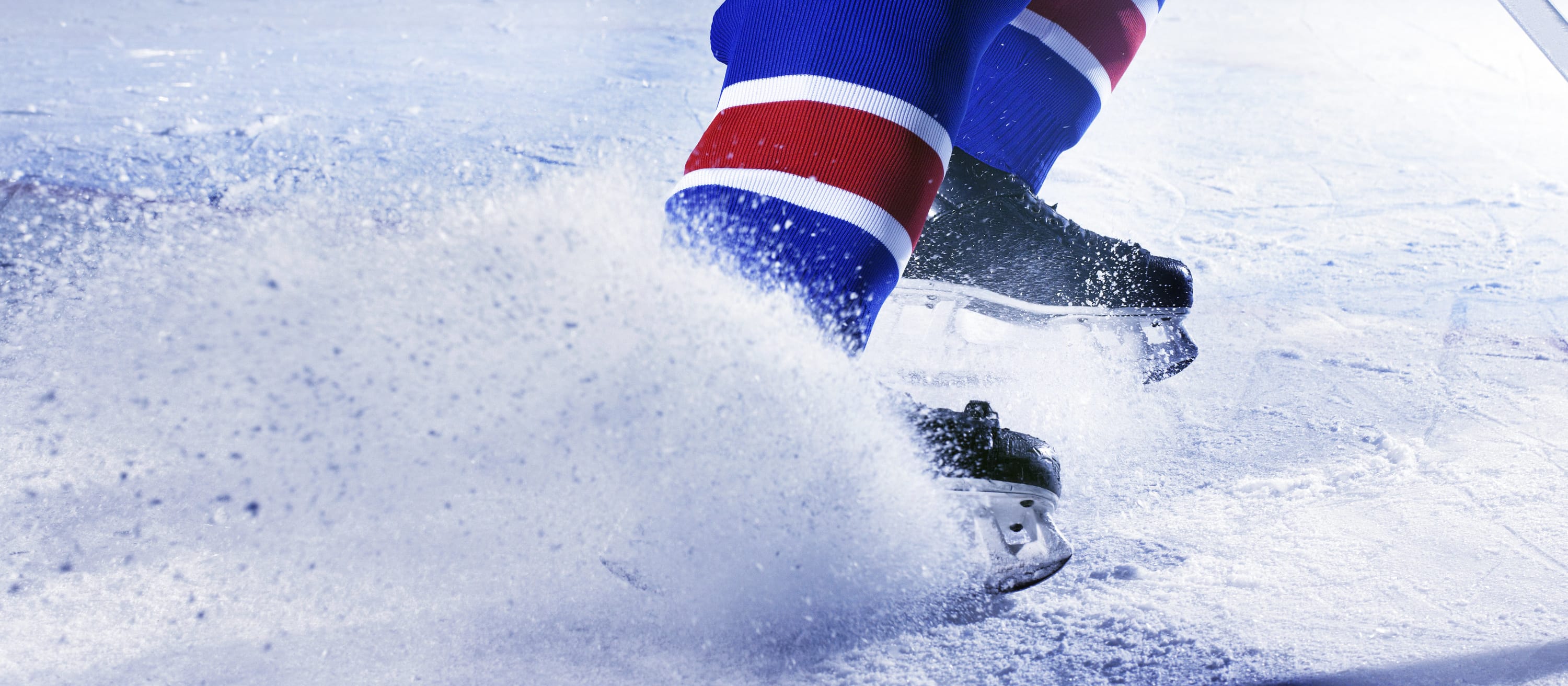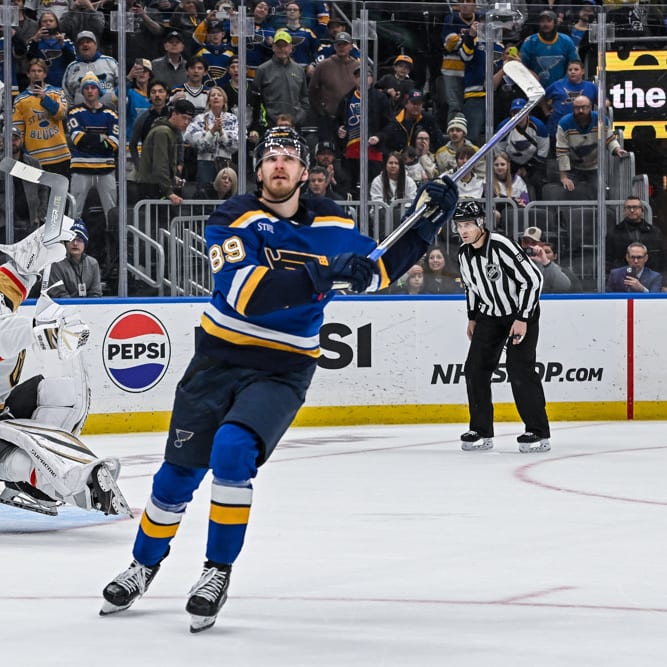This article is part of our Injury Analysis series.
When glancing at injury lists throughout the league, there are several injuries that seem to pop up a lot. One common setback is the groin injury. Both Anaheim's Teemu Selanne and Edmonton's Ales Hemsky were dealing with this issue, and both thought they had put the injury in the past. However, each aggravated the injury upon his return. It is easy to aggravate this type of injury because the muscles in the groin region assist in many common hockey motions. It is not an issue of strength, or flexibility, but both. The groin is an important part of the core and trunk movement; and because it can be easily re-injured, players need to be cautious when they make it back.
Buffalo's Tim Connolly is in dealing with a groin injury of his own. It has been a while since he skated, so how he performs when he gets back on the ice will be important. Players are anxious to resume playing, but they need to be cautious if they feel any soreness during rehab. Many times, those tweaks are anindication that the muscle is not quite 100 percent.
The last player we will look at with this type of injury is Washington's Tom Poti, who has been dealing with a groin injury since October and has re-injured it a couple times. Poti attempted to play through the injury while sitting out practices, but this approach was not as successful as hoped. He did not play last weekend and it
When glancing at injury lists throughout the league, there are several injuries that seem to pop up a lot. One common setback is the groin injury. Both Anaheim's Teemu Selanne and Edmonton's Ales Hemsky were dealing with this issue, and both thought they had put the injury in the past. However, each aggravated the injury upon his return. It is easy to aggravate this type of injury because the muscles in the groin region assist in many common hockey motions. It is not an issue of strength, or flexibility, but both. The groin is an important part of the core and trunk movement; and because it can be easily re-injured, players need to be cautious when they make it back.
Buffalo's Tim Connolly is in dealing with a groin injury of his own. It has been a while since he skated, so how he performs when he gets back on the ice will be important. Players are anxious to resume playing, but they need to be cautious if they feel any soreness during rehab. Many times, those tweaks are anindication that the muscle is not quite 100 percent.
The last player we will look at with this type of injury is Washington's Tom Poti, who has been dealing with a groin injury since October and has re-injured it a couple times. Poti attempted to play through the injury while sitting out practices, but this approach was not as successful as hoped. He did not play last weekend and it is unclear when he will again. The best thing for Poti to do is rest and rehab so the injury does not drag out well into 2011.
Another common injury is the high ankle sprain. This differs from a simple ankle sprain because it deals with the stability of the joint between the two bones in the lower leg, the tibia and fibula. Normal sprains usually involve the lateral or outside ligaments. These types of sprains are easier to recover from because the mortise (the connecting joint mentioned above) is maintained. The high ankle version is more difficult to recover from because the mortise is compromised. The tibia and fibula can spread apart when force is applied. This creates a very unstable ankle and any impact is typically very painful. Tampa Bay's Steve Downie has recently been diagnosed with a high ankle sprain and will be out for 3-to-4 weeks. I suspect he may be out a bit longer depending on the severity of the injury. If Downie notices how long other players have been out with this injury, he would be wise to take his time with his rehab and not come back too soon.
A couple other guys dealing with high ankle sprains are Columbus' Kristian Huselius and Vancouver's Alexandre Bolduc. Bolduc wore a cast on his ankle to allow the ligament to heal without any stress; and though we have been unable to see how he looks since he was initially sent to the minors. Bolduc was called back to Vancouver Sunday, about six weeks after the injury. Huselius suffered a setback last week, but it looks like he dodged a bullet and will be able to return to practice Wednesday. The Blue Jackets will likely be more cautious with Huselius going forward, so do not expect him to return until he is 100 percent. He is still likely a week or two away from getting back to game action.
There are bound be a lot of knee injuries in hockey because of the contact and the potential to lose control on the ice. Buffalo's Rob Niedermayer and New Jersey's Zach Parise are both rehabilitating after undergoing knee surgery. Niedermayer's progress is reportedly going slow, which means he is probably experiencing more pain and swelling than would be expected at this point in the rehab process. Either of the issues will impact whether or not he has regained full motion or if he is able to put full weight on his knee during workouts. Pain will also impact whether or not he is able to re-train his motor recruitment pattern so he does not overcompensate and cause other problems. Parise underwent knee surgery in early November and will likely be out another couple months. Hopefully he is icing his knee a lot to ensure that the swelling goes down as quickly as possible. Then he will be able to focus on strengthening his knee and getting it ready for the ice.
Chicago's Patrick Kane left Sunday's game in the first period with a lower-body injury after being checked against the boards. The exact nature of the injury has not been announced, but he appeared to damage his knee when his stick went between his legs and caused a twisting motion in the knee. Kane is expected to be out a few weeks with the injury, so hopefully his recovery goes well.
We have also seen our fair share of hand injuries. The hand is easy to injure because it contains many parts and does not have much protection besides some ligaments and small muscles. Rehabilitation can be tricky because the hand is used for a few specific tasks, including holding the stick while passing and shooting. Both tasks require a certain amount of strength. The Rangers' Chris Drury and Los Angeles' Alexei Ponikarovsky are both dealing with finger injuries. Drury aggravated his original injury, which has now kept him off the ice for two months, and is still unable to shoot a puck. Ponikarovsky is in a slightly different situation because he has almost recovered from his injury. Ponikarovsky broke his hand, and because fractures heal well and have very little impact on hand strength, he could be back on the ice as early as Thursday.
Lastly, Radek Dvorak suffered a Grade 3 separation of his shoulder, which essentially means he tore most of the ligaments around his acromioclavicular (AC) joint. The AC joint is the attachment between the shoulder blade and the collarbone. Several ligaments hold it together, so a grade 3 separation means that most of the ligaments are torn. This injury usually is not operated on. Instead, doctors immobilize the shoulder and allow the ligaments to heal on their own. Then, the injured player goes through the process of regaining the motion and strength in the shoulder. If the shoulder is not allowed to heal properly, it will become quite unstable and cause pain when performing simple motions. The main concern is how stable the shoulder will be after it is healed. Dvorak is expected to be out 4-to-6 weeks, but I believe four weeks is a bit too optimistic. Dvorak will most likely be back sometime in mid-to-late January.









